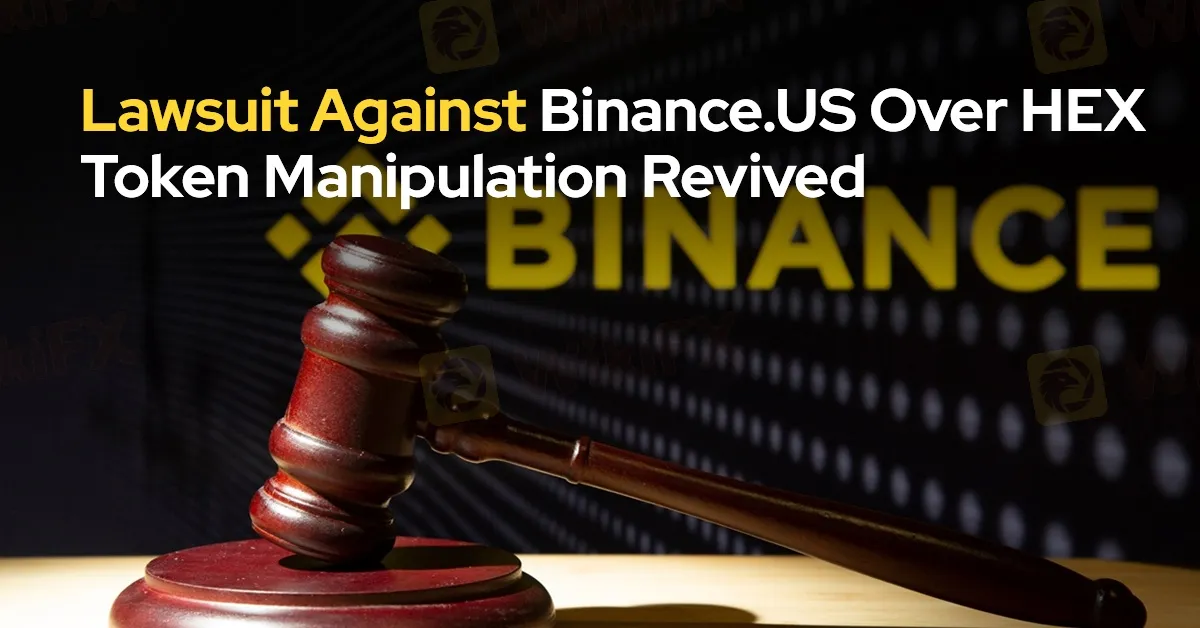简体中文
繁體中文
English
Pусский
日本語
ภาษาไทย
Tiếng Việt
Bahasa Indonesia
Español
हिन्दी
Filippiiniläinen
Français
Deutsch
Português
Türkçe
한국어
العربية
Lawsuit Against Binance.US Over HEX Token Manipulation Revived
Abstract:A U.S. appeals court has revived a class-action lawsuit against Binance.US, which accuses the cryptocurrency exchange of manipulating the HEX token’s price, reopening a legal battle involving significant financial claims and regulatory scrutiny.

A recent decision by a U.S. appeals court has brought new attention to a class-action lawsuit against Binance.US, alleging that the cryptocurrency exchange manipulated the price of the HEX token. On August 12, the Ninth Circuit panel overturned an earlier dismissal by a district court, allowing the case to proceed. This ruling is significant as it challenges the previous court‘s determination that there was not enough connection between Binance.US’s actions and the state of Arizona to justify the lawsuit.
The case, initially filed by Ryan Cox in 2021, accuses Binance Capital Management and Binance.US of manipulating the HEX tokens ranking on CoinMarketCap, a cryptocurrency tracking platform owned by Binance. Cox alleges that this manipulation resulted in HEX trading at a lower price compared to other Binance cryptocurrencies, which were given higher rankings.

The district court had dismissed the lawsuit in February 2023, ruling that Cox had not demonstrated a direct link between Binance.USs activities and the alleged price manipulation in Arizona. The court had applied a standard for “sufficient minimum contacts” that the appeals court found to be incorrect. The Ninth Circuit panel argued that Binance.US had significant enough connections with the broader U.S. to establish personal jurisdiction, even if the direct link to Arizona was not clear.
The Ninth Circuit's decision means that Cox's allegations of price manipulation are now recognized as valid, and the case will continue through the legal system. This development could have broader implications for how courts handle cases involving cryptocurrency exchanges and their practices.
In a related matter, the HEX token, which was introduced by Richard Heart in December 2019, is facing its own legal challenges. On July 31, 2023, the SEC filed a lawsuit against Heart, accusing him of breaching federal securities laws and defrauding investors of at least $12.1 million. The SEC alleges that Heart used investor funds for personal luxury purchases, such as a 555-carat diamond, expensive watches, and high-end vehicles.
The HEX token itself has seen a dramatic decline, currently trading at $0.004, a significant drop from its peak of $0.51 in September 2021. This decline underscores the volatility of cryptocurrency investments and highlights the ongoing legal and financial challenges facing those involved in the sector.

Disclaimer:
The views in this article only represent the author's personal views, and do not constitute investment advice on this platform. This platform does not guarantee the accuracy, completeness and timeliness of the information in the article, and will not be liable for any loss caused by the use of or reliance on the information in the article.
Read more

Forex Brokers vs. Crypto Exchanges: Which Is Safer for Traders?
The world of trading offers two major platforms: forex brokers and cryptocurrency exchanges. Both provide opportunities, but they also come with risks. Traders often wonder which is the safer option. While some lean towards traditional forex brokers, others trust the decentralised nature of crypto exchanges. Let us know if you are #TeamForex or #TeamCrypto!

MoonPay Acquires Helio Pay for $170M to Expand Crypto E-Commerce
MoonPay acquires Helio Pay for $170M to enhance crypto e-commerce solutions. Discover how this deal expands crypto payments for merchants globally.

DuckChain: Everything to Know About $DUCK Token and Listing
Breaking news: DuckChain announces $DUCK token listing, unveiling innovative features and eco-friendly blockchain solutions for decentralized finance.

Cryptocurrencies: A Financial Revolution or a Double-Edged Sword?
The rise of cryptocurrencies and blockchain technology has been compared to transformative milestones such as the creation of money and the advent of the internet. These innovations are reshaping the way assets are valued and traded, pushing the boundaries of traditional finance. However, as with any disruptive technology, the journey is fraught with complexities that demand careful consideration.
WikiFX Broker
Latest News
Wolf Capital Exposed: The $9.4M Crypto Ponzi Scheme that Lured Thousands with False Promises
Confirmed! US December non-farm payroll exceeded expectations
Spain plans 100% tax for homes bought by non-EU residents
90 Days, Rs.1800 Cr. Saved! MHA Reveals
The Yuan’s Struggle: How China Plans to Protect Its Economy
LiteForex Celebrates Its 20th Anniversary with a $1,000,000 Challenge
400 Foreign Nationals Arrested in Crypto Scam Raid in Manila
Singapore Blocks Polymarket Access, Following U.S. and France
OneZero Collaborates with Ladies Professional Golf Association (LPGA)
Housewives Scammed of Over RM1 Million in Gold Investment Fraud
Currency Calculator






